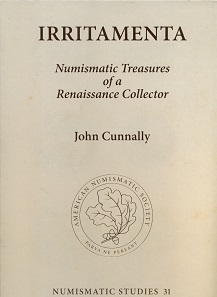by Ursula Kampmann
translated by Christina Schlögl
March 2, 2017 – Irritamenta, Latin for inspiring things. That is how John Cunnally has titled his publication on a manuscript that arrived at Houghton Library in 1955. It is an enigmatic publication, a kind of painted collection catalogue, which – according to its much younger gloss – was supposedly made for the Fugger family by the famous art dealer Jacopo Strada in the year 1550. This publication entails “delightful items” or, as John Cunnally states in the title of his book, “numismatic treasures from a collector of the Renaissance”.
John Cunnally, Irritamenta. Numismatic Treasures of a Renaissance Collector. 2 Vols. Numismatic Studies 31. American Numismatic Society, New York 2016. Hardcover. 21.8 x 30.2 cm. Vol. 1 Text: 411 p. with black-and-white images. Vol. 2 plates: 324 plates in colour. ISBN: 978-0-89722-342-3. USD 200 (ca. Euro 188) + shipping.
That collector is the Venetian Andrea Loredan, member of a prominent Venetian family, which appointed several doges. We know this, because the manuscript entails wonderfully detailed images of the individual coins, Loredan possessed. And since he granted numerous antiquarians access to his collection, they described his coins and included them in their works. In his Discorsi, Enea Vico, for instance, mentions some incredibly rare coins of Loredan. By naming the owner, he secured the catalogues’ correct attribution to the collector.
While Andrea Loredan generously let antiquarians see his collection, it seems to have got all the more difficult as soon as his collection should be sold. Apparently he negotiated with Strada and gave him a catalogue by which the potential buyer should decide to make the purchase. This catalogue was probably the copy that is kept in Houghton Library today. But shortly after, he accused the renowned art dealer of stealing the catalogue. A few years later, Strada and Loredan reached a settlement and sold his collection to Albert, Duke of Bavaria for 7,000 guilders commission. Apparently though, there was friction between them during this deal, too. The events, which are fairly well recorded via Strada’s letters, point to the assumption that Strada did not have the manuscript made, but it probably passed through his hands during the sale, which should explain the gloss that names him as creator.
John Cunnally reconstructs all these processes and proves that the coin collection did not stay in Munich after the Duke of Bavaria had bought it, but it was scattered. Therefore, the manuscript is the only trace to reconstruct and understand what treasures a collector of the Renaissance could accumulate.
For this purpose, the author gives a detailed description and identification of every single one of the 1,220 images in the book. He adds information, sometimes about the coins, sometimes about the misunderstandings and misconceptions of the artist. Thus the reader gets an idea of what a collector could buy in an international city like Venice – the high number of Greek coins, as well as the presence of some Jewish and especially Islamic coins is particularly remarkable. And he or she also realises, what great numismatic knowledge the artist had, considering how confident he completed the inscriptions.
Whoever would like to judge beauty of these images for him- or herself, will receive an outstanding replica of the catalogue – the second volume of the publication, which could almost be deemed bibliophile.
The publication of the ANS, which is distributed by Oxbow Books in Europe, has been published as part of the FINA (= Fontes Inediti Numismaticae Antiquae), a project of several scholars, who are publishing as yet unprinted numismatic sources of the 16th until the 18th century. “Irritamenta“ is an important contribution to the history of coin trade. Every coin dealer who is worried about the German laws on the Protection of Cultural Property should buy it, as this book offers clear proof, that not just Greek and Roman coins, but also Islamic coins were traded in 16th century Germany. This is an assertion that cannot be overstated.
Europeans can order the book via Oxbow.
For customers from the US, it should be simpler to buy the book in the ANS Store.




